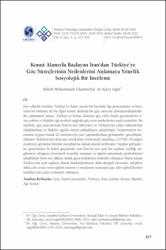Konut Alımıyla Başlayan İran’dan Türkiye’ye Göç Süreçlerinin Nedenlerini Anlamaya Yönelik Sosyolojik Bir İnceleme
Özet
Son yıllarda İranlılar Türkiye’ye hatırı sayılır bir biçimde ilgi göstermişler ve bunların bir bölümü de bu ilgiyi konut alımıyla bir göç sürecine dönüştürmüşlerdir.
Bu çalışmanın amacı, Türkiye’ye konut alımıyla göç eden İranlı göçmenlerin itme-çekme ve ilişkiler ağı teorileri ışığında göç etme nedenlerini analiz etmektir. Bu
nedenle, göç süreçlerinde İran’ın itici faktörleri ve Türkiye’nin çekici faktörlerine
odaklanılmış ve ilişkiler ağının önemi anlaşılmaya çalışılmıştır. Araştırmanın konusuna uygun olarak 22 katılımcıyla yarı yapılandırılmış görüşmeler gerçekleştirilmiştir. Katılımcılara kartopu örnekleme yöntemiyle ulaşılmış, COVID-19 salgını
nedeniyle görüşme formları kendilerine dijital olarak iletilmiştir. Yapılan görüşmeler göstermiştir ki İranlı göçmenler için İran’ın yarı açık bir toplum özelliği sergilemesi, dengesiz ekonomik koşullar sunması ve eğitim sisteminde gözlemlenen
aksaklıklar birer itici faktör olarak göçü tetikleyen etmenler olmuştur. Buna karşın
Türkiye’nin açık toplum olarak nitelendirilmesi, daha dengeli ekonomi, taleplere
daha çok cevap veren eğitim sistemi ve medyanın yumuşak güç işlevi gibi faktörler
İranlılar için çekici etmenler olmuştur. Recently Iranians have shown considerable interest in Turkey, and a remarkable
number of them have turned this interest to an immigration process through
property purchase. Using the push and pull theory and the network theory, this
study aims to analyze the reasons for immigration of Iranians, who migrated to
Turkey by means of the property purchases. Therefore, the push factors of Iran
and the pull factors of Turkey were the focus of this study, and the importance of
networks was attempted to be understood in the immigration processes. Semistructured interviews were according to the subject of this study conducted with
22 interviewees. The interviewees were reached by using snowball sampling, and
the interview forms were distributed digitally due to the COVID-19 pandemic.
The interviews revealed that the push factors for the Iranians involved the fact
that Iran displays features of a semi-open society. Additionally, it creates uneven
economic conditions for its citizens as well as setbacks in the education system.
By contrast, Turkey was regarded by the interviewees as an open society with a
more stable economy and a more responsive education system to public demands.
Besides, the soft power function of the Turkish media also served as one of the pull
factors for the Iranians.

















